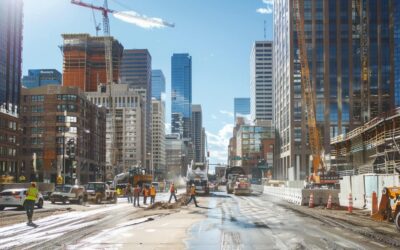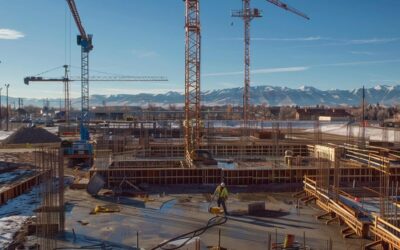When you’re planning a concrete project in Denver, CO, it’s crucial to grasp the various factors that influence costs. From project size to the type of concrete you choose, each decision can significantly impact your budget. You’ll also need to consider labor rates, which vary widely depending on skill levels. But that’s just the beginning—seasonal factors can further complicate your planning. So, what should you prioritize to ensure your project stays on budget and on schedule?
Factors Influencing Concrete Costs
When planning a concrete project in Denver, you should consider several key factors that influence costs.
First, the size and scope of your project play a significant role; larger projects typically require more materials and labor.
Next, the type of concrete you choose can affect pricing, as specialized mixes or finishes often cost more.
You’ll also want to think about site preparation; uneven terrain or existing structures can increase expenses.
Weather conditions in Denver can impact scheduling and productivity, so account for potential delays.
Lastly, local labor rates vary, so researching contractors and their experience can help you find a balance between quality and cost.
Keeping these factors in mind can help you budget effectively for your concrete project.
Average Pricing for Concrete Projects
Understanding the average pricing for concrete projects in Denver is crucial for effective budgeting. Typically, you can expect to pay between $100 and $150 per cubic yard for standard concrete mixes.
For decorative concrete, such as stamped or colored options, prices can range from $150 to $250 per cubic yard.
Additionally, smaller projects like sidewalks or patios might cost anywhere from $3 to $12 per square foot, depending on factors like design complexity and site preparation.
Keep in mind that prices can fluctuate based on material quality and local demand.
Labor Costs in Denver
Labor costs can significantly impact the overall budget for your concrete project in Denver. When hiring experienced contractors, you might find that their rates vary based on skill level, demand, and project complexity.
Typically, labor costs can range from $50 to $150 per hour, depending on these factors. Additionally, keep in mind that labor costs can increase if your project requires specialized skills, such as decorative concrete work or intricate designs.
To manage these expenses effectively, it’s crucial to get multiple quotes from different contractors. This way, you can compare rates and gauge the overall quality of their work.
Ultimately, investing in skilled labor can lead to better results and long-term durability for your concrete project.
Material Choices and Their Impact
Choosing the right materials for your concrete project in Denver can greatly influence both the cost and the final outcome. Different types of concrete mix, such as standard, high-strength, or decorative options, come with varying price tags.
For instance, while standard concrete is often the most affordable, specialty mixes or additives can significantly raise costs. Additionally, you’ll need to consider the aggregates, like gravel or sand, as their quality and source can impact your project’s durability and price.
Don’t forget about finishes and sealants; these can enhance aesthetics but add to your overall budget. By carefully selecting materials that align with your project’s goals, you can achieve the desired results without breaking the bank.
Seasonal Considerations for Pricing
Weather patterns in Denver can have a significant impact on concrete project pricing. During the warmer months, you’ll likely find better rates and more availability, as contractors are eager to take on projects.
However, as temperatures drop in fall and winter, costs may rise. Cold weather can slow down curing times and may require additional materials like insulation, which increases expenses.
Additionally, spring often brings rain, causing potential delays that can affect your budget.
It’s essential to plan your project around these seasonal factors. By scheduling during peak seasons, you can save money, avoid weather-related complications, and ensure a smoother project timeline.
Frequently Asked Questions
What Permits Are Required for Concrete Projects in Denver?
You’ll need a concrete permit for most projects in Denver, including foundations and driveways.
Check with the city’s building department to ensure you have all necessary permits and comply with local regulations before starting.
How Long Do Concrete Projects Typically Take to Complete?
Concrete projects typically take a few days to several weeks to complete, depending on size and complexity.
You should factor in curing time, weather conditions, and your contractor’s schedule to get a more accurate timeline.
Are There Eco-Friendly Concrete Options Available in Denver?
Yes, you can find eco-friendly concrete options in Denver.
Many suppliers offer sustainable mixes, incorporating recycled materials and reducing carbon footprints.
Be sure to explore these choices for your next project to promote environmental responsibility.
How Can I Maintain My Concrete After Installation?
To maintain your concrete after installation, regularly clean it, seal it every few years, and promptly address cracks.
Avoid harsh chemicals and excessive weight, ensuring your concrete stays durable and visually appealing for years.
What Happens if It Rains During My Concrete Project?
If it rains during your concrete project, it can weaken the mix, causing uneven surfaces or cracks.
You should cover the area to prevent damage and consult your contractor for the best steps to take.
Conclusion
In conclusion, understanding the costs of concrete projects in Denver, CO, is essential for staying within your budget. By considering factors like project size, type of concrete, and labor rates, you can make informed decisions. Don’t forget to account for the impact of seasonal weather on scheduling and pricing. With careful planning and the right choices, you can ensure your concrete project is both efficient and cost-effective.



